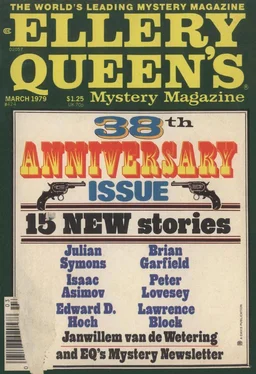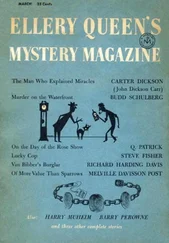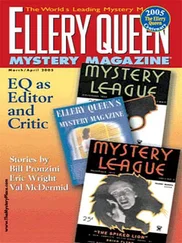Isaac Asimov - Ellery Queen’s Mystery Magazine, Vol. 73, No. 3. Whole No. 424, March 1979
Здесь есть возможность читать онлайн «Isaac Asimov - Ellery Queen’s Mystery Magazine, Vol. 73, No. 3. Whole No. 424, March 1979» весь текст электронной книги совершенно бесплатно (целиком полную версию без сокращений). В некоторых случаях можно слушать аудио, скачать через торрент в формате fb2 и присутствует краткое содержание. Город: New York, Год выпуска: 1979, ISBN: 1979, Издательство: Davis Publications, Жанр: Детектив, на английском языке. Описание произведения, (предисловие) а так же отзывы посетителей доступны на портале библиотеки ЛибКат.
- Название:Ellery Queen’s Mystery Magazine, Vol. 73, No. 3. Whole No. 424, March 1979
- Автор:
- Издательство:Davis Publications
- Жанр:
- Год:1979
- Город:New York
- ISBN:ISSN: 0013-6328
- Рейтинг книги:3 / 5. Голосов: 1
-
Избранное:Добавить в избранное
- Отзывы:
-
Ваша оценка:
- 60
- 1
- 2
- 3
- 4
- 5
Ellery Queen’s Mystery Magazine, Vol. 73, No. 3. Whole No. 424, March 1979: краткое содержание, описание и аннотация
Предлагаем к чтению аннотацию, описание, краткое содержание или предисловие (зависит от того, что написал сам автор книги «Ellery Queen’s Mystery Magazine, Vol. 73, No. 3. Whole No. 424, March 1979»). Если вы не нашли необходимую информацию о книге — напишите в комментариях, мы постараемся отыскать её.
Ellery Queen’s Mystery Magazine, Vol. 73, No. 3. Whole No. 424, March 1979 — читать онлайн бесплатно полную книгу (весь текст) целиком
Ниже представлен текст книги, разбитый по страницам. Система сохранения места последней прочитанной страницы, позволяет с удобством читать онлайн бесплатно книгу «Ellery Queen’s Mystery Magazine, Vol. 73, No. 3. Whole No. 424, March 1979», без необходимости каждый раз заново искать на чём Вы остановились. Поставьте закладку, и сможете в любой момент перейти на страницу, на которой закончили чтение.
Интервал:
Закладка:
What it was, she did not know. She could only feel it there, tight in her hand. Something hard and a little heavy. Something vital to her mission.
The dream always ended the same way. She was climbing the stairs, slowly, lightly, with the thing in her hand held close against her side. She climbed and climbed, but never reached the top of the stairs, and the dream dissolved around her in a red, shifting haze.
But the night the postcard came, there was a difference in the dream. Just as she started up the stairs, breathing the hot, sulfurous air, she looked down and understood at last why she could not see the thing she held in her hand. It was hidden in the folds of her long skirt. The kind of skirt that had not been worn for many years. And she knew that she was not a child, but a tall grown woman. She could almost feel the contours of her body and the strange lines of her face.
This time the dream did not fade. She was dragged from it by busy hands and a voice whispering in her ear.
“Wake up, Ruth! Wake up.”
Pushing the hands away with a strength not her own, she said, “That’s not my name.”
She opened her eyes to see Patricia’s impassive moon face close to her own.
It was almost morning. The windows were pale with light and the shadows in the room were turning gray.
“You were talking in your sleep,” Patricia said. “I think you were having a scary dream.”
Ruth didn’t say anything. She felt an urge to reach out and smack that stupid blank face. To keep from doing so she turned over and buried her face in the pillow. She could still feel the house in the dream. It was just out of sight in her mind, hiding from her.
After a minute Patricia padded back to her own bed.
The room grew brighter and colors began to appear. A blue lampshade. Pink ballet prints on the wall.
Ruth turned over. “What did I say?”
Patricia lifted her head. Her short hair frizzed over her ears. “What?”
“What did I say in my sleep?”
“Oh.” Patricia flopped back down and the bed squeaked. “Nothing that made much sense. Something about blood.” Then she yawned and turned over to finish her sleep.
When Ruth’s father and his wife came home they were brown from the sun and both of them laughed a lot. Ruth could see they were happy being married to each other.
The three of them moved into the house that Ruth had shared with her father. It seemed to have grown smaller. Nowhere could Ruth escape the sight or the sounds of her father and his wife. She made excuses to stay in her room or out in the yard under the maple trees. Sometimes she even visited Patricia, playing endless card games, often letting Patricia win just to postpone going back to the house where she lived.
She hated the house now. The warm colors in the rooms, the worn old rugs, were giving way to pale brittle things. Busy flower patterns covered the chairs and hung across the windows. Ruffles appeared — on the curtains and the beds and even on the tablecloths. Fat china animals of all sizes (“my collection” her father’s wife announced with pride) came to sit on the mantels and shelves. Some of them even had painted eyelashes, and Ruth was not safe anywhere from their coy, mocking smiles.
She was glad when the school term began, where for long hours she could hide in her studies, protected by the familiar smells of chalk dust and new books.
The dream came again and again and she began to look forward to it as she would to a puzzle that must be solved.
Sometimes when she woke from it, even in the middle of the night, she would go to the mirror and turn on the light, wondering who she would see. She was disappointed to find her own slender face and straight dark hair there in the glass.
On the first day of November the weather turned suddenly and bitterly cold. Ruth walked home from school slowly, savoring the emptiness of the streets and the wind that smelled of dead leaves and lost summer.
Inside the house she found her father’s wife wrapped in a heavy sweater and complaining of drafty windows. She insisted that Ruth put on more clothes and drink a cup of hot soup. “We’ll catch our death,” she said ominously.
That night Ruth’s father brought in a supply of wood and stacked it against the house near the back door. Ruth watched as he chopped away at the logs with a small hatchet, trimming them to fit the fireplace in the living room. Brown leaves swirled around his ankles and the blade of the hatchet flashed in the light from a single bulb over the back door.
Later, as flames began to flower in the fireplace, he put one arm around his wife and the other around Ruth.
“That should keep my girls warm,” he said and hugged them both.
To Ruth the room was already suffocatingly hot, and in the light from the fire the china animals were laughing at her, their hard mouths melting in glee.
That night she had the dream again.
She glided through the crazy-quilt of rooms, her long skirt brushing the walls and doorways without a whisper of sound. Sun glittered against the windows and the air was furnace-hot, burning in her throat and lungs.
She climbed the stairs and the thing in her hand pressed against her leg with heavy intent.
For the first time she reached the top of the stairs and saw the door she was to enter. It led into a bedroom.
A sound pulled her out of the dream.
She could feel the bed beneath her body, could sense her own room around her, but she did not open her eyes. I must know, she thought. I must know.
Tap-tap on the door.
“Wake up, Ruth, honey, or you’ll be late to school.” Again tap-tap. “Ruth?”
“That’s not my name.”
She whispered the words in someone else’s voice. Then she opened her eyes. She looked down at her hand and flexed her fingers. They were cramped and there were small indented crescents on her palm made by her nails as she gripped the thing in her dream.
The following Saturday was her birthday.
Her father and his wife gave her a red dress. It was an expensive dress, shirred and flounced. There were puff sleeves and small shiny buttons.
Her father had always given her books and games before. She turned to him, but she could not find him behind the smile his new wife had given him.
“Thank you very much,” she said, feeling the dress cold and slick under her hands.
There was a lamb roast for dinner and a large frosted cake, and later they went to the theater to see a magician and a hypnotist.
Ruth wore the red dress and sat next to her father’s wife. She suffered the small soft hands touching her now and then and the little voice whispering, “Isn’t he marvelous?” each time the magician performed a trick.
She chirps, Ruth thought. She chirps like a silly bird.
There was an intermission and Ruth was given ginger ale to drink. She stood quietly in her new red dress, sipping from a paper cup and saying yes, she was having a wonderful time, and yes, the magician was marvelous.
She disliked magicians almost as much as she did clowns. Her father had known that once, but he did not seem to remember. She looked at him, wanting to ask, “Where are you, Daddy?” — but, of course, she did not. She was much too polite.
After the intermission the hypnotist appeared on stage. He did not look the way Ruth thought a hypnotist should look — lean and satanic with sleek hair and perhaps a painted beard. He had almost no hair at all and his body reminded Ruth of a stuffed bear.
He introduced a woman whose name was Christine, but under hypnosis she called herself Zela and spoke of life in an ancient middle-eastern kingdom. The hypnotist explained that this was not unusual. Certain individuals, under hypnosis, or perhaps in sleep, re-lived earlier incarnations.
Читать дальшеИнтервал:
Закладка:
Похожие книги на «Ellery Queen’s Mystery Magazine, Vol. 73, No. 3. Whole No. 424, March 1979»
Представляем Вашему вниманию похожие книги на «Ellery Queen’s Mystery Magazine, Vol. 73, No. 3. Whole No. 424, March 1979» списком для выбора. Мы отобрали схожую по названию и смыслу литературу в надежде предоставить читателям больше вариантов отыскать новые, интересные, ещё непрочитанные произведения.
Обсуждение, отзывы о книге «Ellery Queen’s Mystery Magazine, Vol. 73, No. 3. Whole No. 424, March 1979» и просто собственные мнения читателей. Оставьте ваши комментарии, напишите, что Вы думаете о произведении, его смысле или главных героях. Укажите что конкретно понравилось, а что нет, и почему Вы так считаете.












